Slowly But Surely, Republicans Seem To Becoming Less Socially Conservative
It will be some time before sanity prevails in the GOP, but slowly but surely Republicans seem to be becoming less socially conservative.
If a new Gallup poll is any indication, there seems to be a change occurring in the Republican Party:
PRINCETON, N.J. — The percentage of Republicans and Republican-leaning independents who describe themselves as both social and economic conservatives has dropped to 42%, the lowest level Gallup has measured since 2005. The second-largest group of Republicans (24%) see themselves as moderate or liberal on both social and economic issues, while 20% of all Republicans are moderate or liberal on social issues but conservative on economic ones.
These data are from Gallup’s Values and Beliefs poll, which since 2001 has included questions asking Americans to rate themselves as conservative, moderate or liberal on social and economic issues. These trends show not only that Americans as a whole have become less likely to identify as social or economic conservatives, but also that Republicans’ views are changing along the same lines.
This change in recent years has been significant. The percentage of Republicans identifying as conservative on both dimensions has dropped 15 percentage points since 2012, largely offset by an increase in the percentage who identify as moderate or liberal on both dimensions. Still, the current ideological positioning of Republicans is not unprecedented; the proportion of social and economic conservatives was as low or lower from 2001 through 2005.
This chart shows how these numbers have changed over the years:
Not surprisingly, there’s a strong correlation with age:
The percentage of Republicans and Republican-leaning independents who are conservative on both social and economic issues rises steadily with age. An analysis of aggregated surveys conducted since the 2012 election shows that the size of the social and economic conservative group is twice as large among Republicans aged 65 and older as it is among those aged 18 to 29. This may be good news for GOP candidates who are running on a conservative platform and can assume that older Republicans will constitute a sizable portion of primary and caucus voters. But it would not be such good news when it comes to the challenge of energizing a broader base of Republican voters to come out to vote in the typically higher-turnout general election.
Chris Cillizza comments on these results:
Politicians — and this will be some breaking news — tailor their messages to the people who they believe will turn out to vote. And, history suggests that the likeliest voters tend to be the truest of true believers in your party’s base. They are the ones who prioritize voting — every time and always.
That’s especially true in states like Iowa and South Carolina, which will cast two of the first three votes of the 2016 Republican presidential primary season. In Iowa in 2012, 57 percent of GOP caucus attendees described themselves as evangelical or born again; that number was 65 percent in South Carolina. The truth of the matter then is that the men and woman who want to the be the GOP nominee don’t really care all that much about the fiscally conservative/socially moderate Republicans living in the other 48 states. To win the Republican presidential primary, you need to win conservative voters. Everyone else, theoretically, will come along for the ride.
That basic dynamic — with a bit of a twist — explains what’s going on in the growing partisanship among Congressional Republicans too. Two straight decennial redraws of the 435 congressional districts in the country have largely solidified the partisanship of the House seats in the country. That means that the path to Congress for most Republicans (and, to be fair, Democrats) is to make the base happy. Just like at the presidential level, the most conservative voters tend to be the ones who vote in downballot contests — meaning that if you are seen as the most conservative person in a race, you are very likely to win. The only danger to an incumbent Republican in most of the districts in the country is a primary challenge from their ideological right. Given that, Republican incumbents do everything they can to compile as conservative a voting record as possible while in Congress.
(…)
If both the country as a whole and the Republican party are moving away from pure conservatism — particularly on social issues — that translates to a massive gap between what it takes for a GOP candidate to win a presidential primary and what it takes for that same candidate to win a presidential general election.
The caveats that Cillizza comments on are well-taken. Even if these ideological changes inside the Republican Party are a real thing and continue into the future, which certainly seems to be the case, it will likely be several more election cycles before those changes have an impact on the policy positions the party takes and the candidates it selects in primaries. By and large, it is the people who are conservative on both social and economic issues that are most active in the party and most likely to vote in primary elections. This is especially true in the south, and the effect becomes even more appparrent in elections at the Congressional and state legislative level. That’s likely to remain the case for some time to come, and candidates that are less socially conservative are likely to find themselves losing to social conservatives in primaries for awhile. If this trend continues, though, then eventually the Republican Party will change.
We already see some evidence of this, of course, in the fact that Republicans as a whole have tended to become more tolerant on issues such as same-sex marriage even as those who most strongly identify themselves as conservative remain firmly opposed. You can find similar changes in attitude in connection with issues such as the war on drugs, where polling has shown increasing numbers of self-identified Republicans saying that they favor legalization of marijuana for medical purposes, decriminalization to the point where marijuana possession is treated like a traffic ticket, and even outright legalization. On these and other issues, though, the base of the party remains staunchly in the control of the social conservative wing of the party and, for reasons that have to do with both demography and geography, that’s likely to remain true for some time to come. It took time for the Republican Party to become as dominated by its hard right wing as it is today, and if these trends that show Republicans as a whole becoming more socially tolerant continue it’s going to take some time for things to change. Between now and then, the GOP is likely to find its hard right base becoming even more of an albatross.
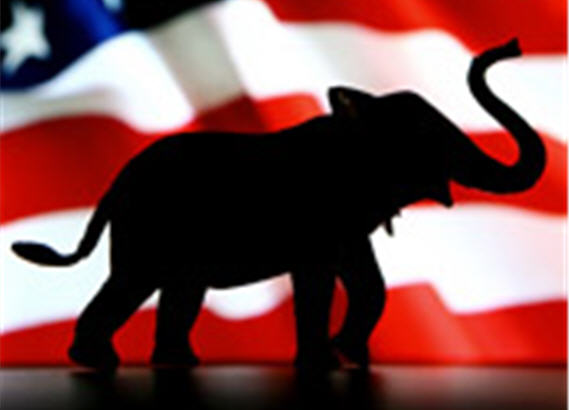
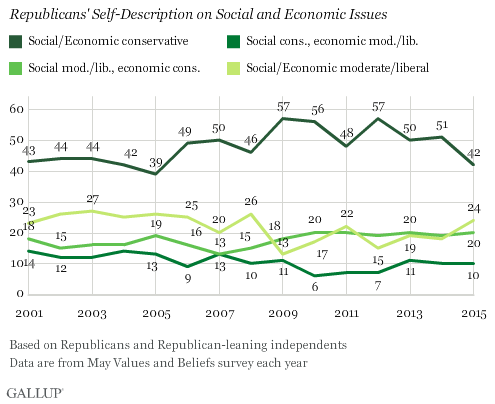

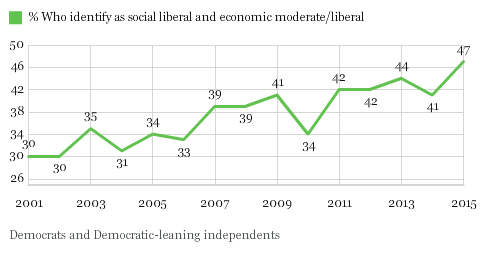

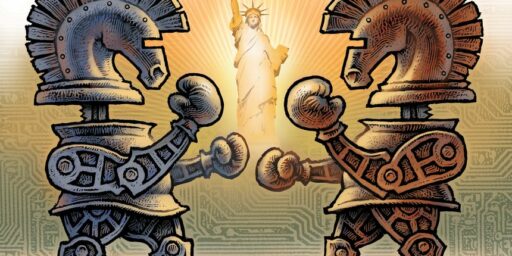

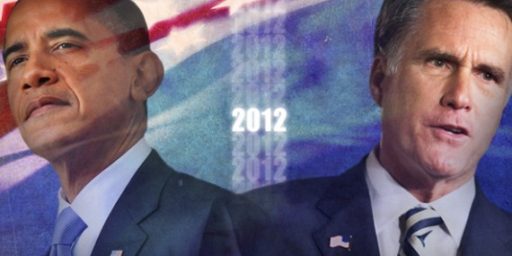
No…this is just wrong.
You are confusing Fundamentalism, or Republicanism, with Conservatism. Marriage equality…equality for all Americans under the law…is a Conservative position. As is, for that matter, Health Care Reform, and recognizing the Science of Climate Change. This is like the abortion discussion, in which you refuse to label the participants in the discourse by their actual position.
The attempt to ban same-sex marriage is an attempt to disadvantage a class of citizens based on their identity. This is not Conservative. William F. rid his party of the Birchers. This Republican Party is now all about the Birchers. It is NOT Conservative.
Shame on you for taking the lazy way out…these people are not Conservatives.
A start but still about 50% crazy… And that crazy part votes at higher percentages in the primaries.
@Doug Mataconis:
I don’t think that this poll can be used to indicated anything about any change occurring in the Republican Party.
There’s one thing that’s absent from the Gallup article.
The margin of errors for the sub-groups being reported upon.
I wonder why that wasn’t included….
Gallup polled a total of 1024 adults, let’s say that half of those are either Republicans or Republican leaning independents, so that’s 512.
That would mean that:
215 identified themselves as Social/Economic conservative.
123 identified themselves as Social moderate/liberal, economic conservative
102 identified themselves as Social conservative, economic moderate/liberal
51 identified themselves as Social/Economic moderate/liberal
Making the margin of error of these subgroups so high (double digits for the three smallest sub-groups) that you really can’t say anything about any change.
To put it simple, it’s rubbish.
But people are writing about it!
@PJ:
Yep. Useful propaganda, though, if Republicans believe it and the crazies start to feel even more isolated.
Well, one important point: who exactly calls themselves a Republican changes with time. I left the Republican Party around 2004 as did a lot of people. This “evaporative cooling effect” made the Republican party become more socially conservative (see the trendline around 2005) simply because the party was increasingly comprised of *only* social conservatives. So the movement toward a more tolerant stance could either be that Republicans are becoming more tolerant or that more tolerant people are calling themselves Republicans. I suspect it’s a bit of both. As the Republican rhetoric on social issues is cooling, I find myself less disgusted with them. And I’m almost encouraged by the leadership several red states are taking on criminal justice reform.
@Hal_10000:
Congratulations — you’ve just proven that you aren’t a superdestroyer sock puppet.
I agree in principle, but I don’t see any current trends or drivers that would cause moderates of any sort to associate themselves with the Republicans if they weren’t already doing so. I think we’re going to have an identify crisis within the Republican Party pretty soon, in which fear, hatred, and greed fight it out for the true soul of the party — followed by collapse and reorganization.
At that point, you might get more tolerant people re-identifying as Republicans. Short term, I can’t see it.
Speaking as someone who used to vote for the best candidate (which sometimes meant I pulled the lever for a Republican) and who now would literally not vote for a Republican for dogcatcher (because the party does such damage and increasing the majority only increases the damage), the current Republican electorate seems to be composed of 1) people who are driven by anger and contempt and who find fellow travelers in the Republican leadership, and 2) those that pine for the days of the sane, competent Republican party and have managed to convince themselves that by voting for the marginally better Republican candidate they can help to bring that long lost party back.
A base can’t be an albatross. It’s literally your base. It’s the people who are going to vote for you regardless of what you do, or they’ll end up with someone they despise more.
You counter with “you need to still turn them out,” I counter with “it’ll still be hard to do that if they’re all in wheelchairs.”
@DrDaveT:
Why would anyone who wants a career in politics want to put the effort into rebuilding a Republican Party that is irrelevant to politics when they are easily just be a Democrats. It is very easy for the prep school, Ivy League graduates to have a successful career as a Democrat and actually have an impact on policy and governance even while living their personal lives in a way that would look much more conservative than progressive.
Don’t worry. Whatever happens on gay marriage, they’ll still have abortion, trickle down, AGW denial, and Neocons.
Just exactly who are these people? Can we find them and put a big red ‘S’ on their foreheads?
@OzarkHillbilly:
Indeed. I asked that same question in a thread a few months ago, but didn’t get any answers.
One possibility is that these are people who think of themselves as ‘moderate’ and ‘liberal’, but are in fact neither by any objective standard. Self-delusion is easy.
Another possibility is that these are actual moderate, liberal people who don’t vote — perhaps because they can’t bring themselves to vote for a Democrat.
I think it would be a fascinating study, though, to find out who these people are and what they actually believe.
@DrDaveT: Possibly those who a while back would have called themselves “Rockefeller Republicans?”
Today they’d all be smeared as RINOs, of course.
@superdestroyer:
Because real “Capital C” Conservatism has a lot to offer the country.
What you and your ilk practice or believe in or follow is not Conservatism. And you are right…it’s a pointless movement…not worthy of anyone’s attention. The only thing you know is the absolutism of white identity politics…a losing cause.
Conservatism would not seek to disadvantage others because of their identity. Conservatism wouldn’t load on debt in good times only to slash it when it might do some good. Conservatism wouldn’t launch un-necessary wars based on zero evidence and no preparation. Conservatism would ridicule supply-side economics, not turn it into a catechism.
This country could use a healthy dose of Conservatism. That’s why re-building the Republican party would be worth the effort.
@DrDaveT: My 70+ parents – who were actually very socially liberal when raising my siblings and me (e.g., pro choice, pro SSM – now they think abortion should be outlawed even for rape and incest, and SSM is “special treatment”) – lost their minds ca. 2007 *koff* but still describe themselves as both moderate and liberal… while they breathlessly pass on every iota of rumornews, outrage, and snide racism they hear from Fox and Rush Limbaugh without a second thought. They live a nice small town in the richest, whitest county in Ohio and they cower in fear with their guns behind their locked doors and their alarm system every night. I don’t even.
@C. Clavin:
So your argument is that a conservative party can exist that supports high taxes, more government intervention in the market place, and some ill-defined foreign policy that cannot survive the first live report on CNN.
Anyone who wants to raise taxes and increase the public sector will always be more at home in the Democratic Party than trying to create some sort of sustainable conservative party. Once again, every issue or policy that progressives bring up just shows what the dominant political trends are in the U.S.
As the Republicans lose every issue where they can distinguish themselves from the Democrats, there is no reason for a conservative party to exist. The idea that if conservatives give massive victories to homosexuals and Latinos that those two groups will give up their automatic voting for the Democrats is laughable. The more the Republicans pander to the core blocks of the the Democratic Party, the stronger the Democratic Party becomes.
@superdestroyer:
So you mean like Reagan and Bush41?
Every Republican grows the public sector.
You are operating in a mythical world.
try joining the rest of us in the real world.
@C. Clavin: You made a similar comment on Doug’s June 9 https://www.outsidethebeltway.com/americans-becoming-vastly-more-accepting-of-homosexuality/
I was unsure whether you meant “a) our current right wing GOPs aren’t really conservative by any historical standard, or b) that people who say they’re conservative often aren’t.”
I see you meant a), and I kind of agree. But I confess that the more I look at conservatives, particularly current American conservatives, the less I think I understand what they are. Wiki says, “Some conservatives seek to preserve things as they are, emphasizing stability and continuity, while others, called reactionaries, oppose modernism and seek a return to “the way things were”.” I think that’s a good description. And I would disagree with you about SD. I think the second half, given the scare quotes, fits SD. That’s not what most people mean when they say “conservative”, but it’s what we get in the modern GOP.
Not my field, but I think you’d call the first part of Wiki’s description “Burkean” conservatism. I think you mean that as what they aren’t. There used to be Republicans who fit that description. At the congressional level, was Lincoln Chafee the last one?
I’ve read that psychologists put a lot of effort into studying why people are conservative, and hit a wall defining conservative. A modern American conservative claims to oppose centralized government. A Russian conservative is all for it. They couldn’t find policy preferences that matched conservative across time and culture. I think they finally settled on defining conservative as a psychological trait. This is sort of a circular definition, but you gotta do what works.
Corey Robin thinks conservatism has always really been reactionism. There’s a lot of truth to the snarky line that conservatism is opposition to whatever liberals are for, updated daily.
I think the psych guys are mostly right. Conservative is mostly a personality thing. Or maybe it’s just a big amygdala.
Anybody else want to weigh in? What is a modern American conservative? And does that match any historical meaning of “conservative”?
@C. Clavin:
Reagan and Bush grew the government and increased the federal debt and all the happened in the long run is that progressives and the Democrats became more powerful and the Democrats almost have a lock of the Presidential general election. Reagan and Bush I (and their staffs) were incapable of thinking about the long term impacts of increasing the size of the government, deficit spending, immigration amnesty, and the pursuit of cheap labor for their cronies. Reagan and the Bush Clan fail to understand that if government is about spending and who benefits from the spending, then the party with the growing demographic groups is always going to win. And in the long run, the Democrats are now in a position where they cannot lose.
Reagan and the Bush Clan are the reasons that the Ivy League is 95% progressives liberals That is why anyone other than a grifter or self-promoter who wants a career in politics will be a Democrat and the hope that someone who has the skills to save a conservative party is foolish.
@superdestroyer:
Yes, but was that a good thing or a bad thing?
You have completely divorced, in your mind, questions of whether policies are good or useful or effective or pernicious or destructive or neutral or insane from the question of which political party seems to benefit — and then you focus on the latter, as if it mattered for its own sake.
If Reagan’s policies made people better off, then it doesn’t matter that they also helped Democrats. If Reagan’s policies made people worse off in the long run, then they should be criticized on that basis — not because they did or did not give Democrats more political power.
Yes, I know, that’s too complicated for you. We get that.
Marriage in general is a very Conservative concept.
The idea of “stable family unit” that is the foundational base for legal, financial and social structures is Conservative. Society is built of families as the primary focus, families contain individuals. A Liberal position would be the individual is the foundational base of society that these structures should derive from. Individuals build society as the primary focus, society contains families as a secondary subgrouping.
The arguments over what the definition of marriage is traditionalist, not Conservative. The two are NOT the same. Traditions change, thus being traditionalist is a crap shoot – what tradition are you holding to? You’re arguing for a specific moment in history as your ideal template. Minor details that can fluctuate. Traditionalists are holding that a challenge to their tradition is an attack on the entire idea; a Conservative understands that since marriage is their preferred state of being for society, the more married people there are, the better off we are as a whole. If you truly value the family as the stable base unit, there should be rejoicing more people are interested in participating in your paradigm, not screaming the sky is falling in since its not your chosen version they are espousing.
@superdestroyer:
Wow…talk about delusions.
You really need some professional help.
@gVOR08:
I agree…that would be a great topic for discussion.
I do know that today’s Republicans are radicals pursuing a radical ideology…and thus not by any means Conservative.
@gVOR08: Well there’s the Leo Rosten line, “A conservative is one who admires radicals centuries after they’re dead.”
The Gallup Poll is based on polling Republicans and Republican-leaning Independents – in other words, Republicans and Republicans.
Also, I wonder how much Abortion and Women’s Reproductive Rights were a part of the polling?
@OzarkHillbilly:
They are most likely people in deep red, deep crazy territory (rural bible belt etc) that see themselves as moderate because they are relative to the crazy they are surrounded by.
@C. Clavin:
Who were these capital C conservatives?
If Conservatism is anything like conservatism, yes it would and has for the entire history of our nation. Republicans supported reducing disadvantage due to identity for some when they were the (P)rogressive party.
and
I don’t know if a Conservative would, but a conservative would because that’s what we do and conservatives are about preserving the status quo.
Moderate Republicans did till the 80s. Has there been a prominent Conservative since then?
@superdestroyer:
Priorites never change with time. Nothing exists on a spectrum. Everything is black and white. To give an inch is to completely lose one’s identity. Blah, blah, f*ing blah.
Why are you here? In all seriousness, why do you bother to repeat this drivel endlessly where absolutely no one agrees with you or will ever agree with you?
@Grewgills: It was before the 80s, but give H. W. Bush credit as a moderate Republican. He ridiculed supply-side econ, famously called it “voo-doo economics”. Of course when they offered him the veep slot he decided his bread was buttered better if he believed it after all.
@C. Clavin:
So now an uber-lefty like you is the arbiter of what is and is not conservatism.
Wow! That’s hubris – even for you.
You don’t get to define what conservatism is.
Conservatism is belief in a limited government, opposition to tax increases, support for a strong foreign policy and defense of traditional normal American values …like marriage for instance.
@James P:
I see you left off respect for private property. Probably wise since uou have been banned from this site on account of your sheer assholery. Yet here you are, despite the clearly-expressed wishes of the owner.
You are demonstrating a complete disregard for simple courtesy and the for the property rights of the blog owner. Neither is conservative.
In this as in everything else you are a fraud.
To my ears, the “no true conservative” stuff aimed against today’s extreme-right-wing GOP sounds just as wrong as when those same extremists rail against RINOs. It’s like when liberal Christians argue that “true” Christianity emphasizes love and de-emphasizes hellfire (despite Jesus being pretty explicit about the Hell stuff).
Sorry, you don’t get to disown your fellows that easily. Although I would certainly argue there were lots of illiberal things about Marx, I wouldn’t discount him as a liberal for it. (And possibly I’d say the same about Stalin, as queasy as it makes me. These words “conservative” and “liberal” are very big tents.) By the same token, it can make sense to say that same-sex marriage is a conservative thing, or even that it’s more conservative than liberal, but it is not the conservative thing.
Even if we’re now at the point where opposing it is a matter of turning back the clock rather than keeping the clock hands steady — reactionaries are still conservatives. (You can be conservative and support women’s suffrage, or “so” conservative that you oppose it. Such opposition, though practically nonexistent today, didn’t just fall off the map into “no longer a conservative position” territory.)
@James P:
Go away…as the owners of the website asked you to.
@Lenoxus: Thank you for the thoughtful post. Like you, I’m a little more hesitant than some of my fellow liberals here to get into the “today’s conservatives aren’t true conservatives” game. I do think it’s definitely true that the GOP has gone totally nuts in recent times in a way that ought to have bewildered conservative icons like Buckley. But then we, too, often make the mistake of romanticizing Buckley and his ilk in our efforts to cast them as a foil to today’s conservatives. It’s easy to forget that Buckley was, at various times in his career, a defender of white supremacy, McCarthyism, and fascism. It’s true that he stood up to the Birchers, but we need to realize that what he opposed wasn’t so much extremism as crude extremism.
It’s something that dawned on me in the late 1990s during my early adult years. I came of age politically around the time Limbaugh was getting big, and it had a big impact on me seeing how much of American conservatism was dominated by sheer demagoguery. I saw regular, ordinary people who listened to his program and would soon be jabbering about how the Clintons offed Vince Foster. Then, one day, I happened to come upon a piece by William F. Buckley himself commenting on President Clinton’s criticisms of Limbaugh. I’d heard how Buckley was one of the intellectual giants of the conservative movement, so I was expecting him to deliver a stinging rebuke against Limbaugh and to explain how true conservatives don’t put up with the nonsense he spews, etc.
His column said none of that. He conceded that Limbaugh “induces hatred,” and that “if I were a liberal, I would hate him,” but he went on to argue that Truman and FDR did the same thing to the other side. No mention of Limbaugh’s lies or conspiracy theories. Reading the column, you’d think Limbaugh’s only sin was being mean to liberals. It was at this point that I realized that the difference between the Buckleys and the Limbaughs was more of a good cop/bad cop game than any substantive disagreements. Buckley’s role was to give conservatism a respectable face, but what lay beneath was a lot of the same ugly ideas that animated the Birchers and which were the predecessors to today’s Tea Party.
@C. Clavin:
In 1981, a significant number of students at the Ivy Leagues were Republicans. By 2008, the Young Republicans at Harvard could meet in a booth at a diner. Reagan and the Bush Clan failed to understand that niche marketing and political gimmicks never make up for policy failures.
Smart college students can look at the multiple policy failures of the Republicans, conservatives inability to think about the long term impact of their own policies, and the Republicans inability to do math and realize that there is no future for conservative politics.
I suspect that most Ivy League students interested in politics realize that the career path of David Axelrod and Valerie Jarrett is a much easier way to influence policy and governance and to amass political power rather than being a grifter in the Republican Party to running for office.
@Grewgills:
When progressives keep repeating their mantra of “Go Team Blue” and writing about how brilliant they are, I just like to point out that the path that politics is on in the U.S. And no, every place in the U.S. will not be like Burlington, Vt.
@Kylopod:
I’ve stumbled across some bits and snatches of standard issue conservative hackery from Buckley. I was thinking about reading some of his stuff to see if he deserved his reputation. I think you just saved me the time. I enjoyed
as I’ve said for some time that Reagan’s great triumph was to put a pleasant avuncular face on that ugliness.